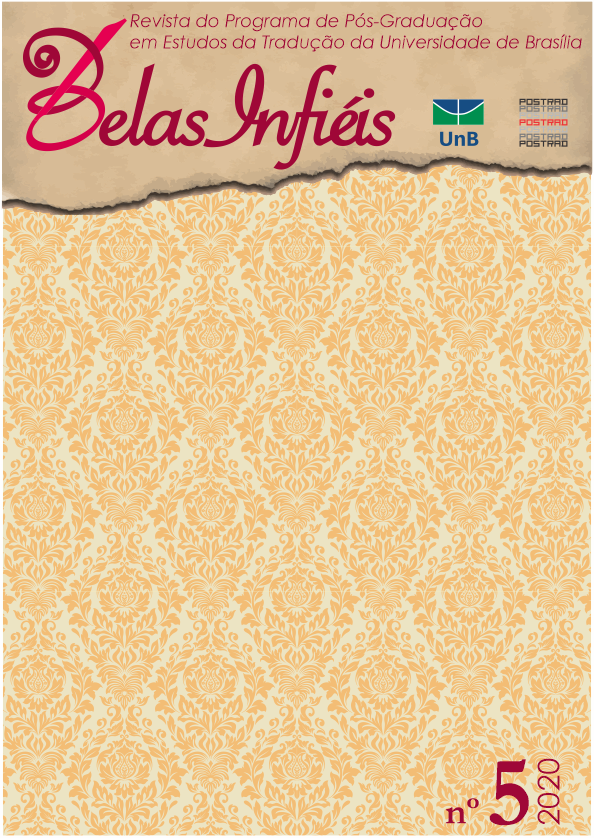A tradução de “Pink Dog” de Elizabeth Bishop para o contexto baiano contemporâneo de poesia slam: um processo de recriação
DOI:
https://doi.org/10.26512/belasinfieis.v9.n5.2020.26762Palabras clave:
Tradução de Poesia. Domesticação. Poesia Slam. Violência Urbana.Resumen
O poema "Pink Dog" de autoria de Elizabeth Bishop revela a denúncia de um tipo social marginalizado pela sociedade carioca dos anos de 1960, maquiada pelo carnaval da “cidade maravilhosa”. Este artigo comenta e justifica uma tradução domesticante do poema para a cidade de Salvador na década de 2010. A domesticação foi realizada a partir de escolhas linguístico-culturais para o português brasileiro na variedade soteropolitana. Alguns elementos foram bastante preservados, tais como a forma e o tom. O tom de denúncia se manteve jocoso e agressivo, porém agravado, por conta do estilo do poema traduzido, pois se tornou um poema slam. A tradução pode ser caracterizada como poesia slam por sua “batida” mais violenta e popular. Assim, contextualizando ambos os textos fonte e alvo e com apoio da metodologia de tradução de poesia sugerida por Robert Bly (1986), o artigo apresenta as estratégias e decisões que foram tomadas durante o processo de recriação (BRITTO, 2002). A domesticação justifica-se pela constante urgência em denunciar e atualizar em forma de poesia os abusos de violência na Bahia semelhantemente mascarados pela importância social do carnaval tal como no Rio de Janeiro.
Referencias
ASKEW, Kelly M. As Plato Duly Warned: Music, Politics, and Social Change in
Coastal East Africa. Anthropology Quarterly, v. 76, n. 4, p. 609-637, 2003. Disponível em: https://www.jstor.org/stable/3318282?seq=1. Acesso em: 20 jul. 2020.
BLY, Robert. The eight stages of translation. The Kenyon Review, v. 4, n. 2, p. 68-89, 1982. Disponível em: https://www.jstor.org/stable/i403449. Acesso em: 20 jul. 2020.
BRITTO, Paulo Henriques. Para uma avaliação mais objetiva das traduções de poesia. Eutomia, Recife, v. 1, n. 20, p. 226-2,42, dez. 2017. Disponível em: https://periodicos.ufpe.br/revistas/EUTOMIA/article/view/234813. Acesso em: 16 jul. 2020.
COSTA, Márcia. São Paulo e Rio de Janeiro: a constituição do Esquadrão da Morte. Anais do XXII Encontro Anual da ANPOCS. Caxambu/Minas Gerais, 1998.
CUCINELLA, Catherine. Dress up! Dress up and dance at Carnival!: The Body in Elizabeth Bishop's Pink Dog. Rocky Mountain Review of Language and Literature, v. 56, n. 1, p. 73-83, 2002. Disponível em: https://www.jstor.org/stable/1348014?seq=1. Acesso em: 20 jul. 2020.
D'ALVA, Roberta Estrela. Um microfone na mão e uma ideia na cabeça ”“ o poetry slam entra em cena. Synergies Brésil, n. 9, p. 119-126, 2011. Disponível em: https://gerflint.fr/Base/Bresil9/estrela.pdf. Acesso em: 20 jul. 2020.
DE MELLO NETO, David Maciel. ‘Esquadrão da morte': Uma outra categoria da acumulação social da violência no Rio de Janeiro. Dilemas-Revista de Estudos de Conflito e Controle Social, v. 10, n. 1, p. 132-162, 2016. Disponível em: https://revistas.ufrj.br/index.php/dilemas/article/view/7752. Acesso em: 20 jul. 2020.
DE OLIVEIRA BATISTA, Eduardo Luis Araújo. O método de Elizabeth Bishop na tradução de poemas brasileiros. Cadernos de tradução, v. 1, n. 15, p. 55-68, 2005. Disponível em: https://periodicos.ufsc.br/index.php/traducao/article/view/6582. Acesso em: 20 jul. 2020.
PYM, Anthony. The moving text: Localization, translation, and distribution. John Benjamins Publishing, 2004.
VENUTI, Lawrence. The translator's invisibility: A history of translation. Routledge, 1995.
VENUTI, Lawrence. Escândalos da Tradução. Traduzido por Laureano Pelegrin, Lucinéia Marcelino Villela, Marileide Dias Esqueda e Valéria Biondo. São Paulo: EDUSC, 2002.
Descargas
Publicado
Número
Sección
Licencia
Derechos de autor 2020 CC BY

Esta obra está bajo una licencia internacional Creative Commons Atribución 4.0.
Copyright Statement
Given the public access to this journal, the texts are free to use but requires the recognition of the original authorship and initial publication in this journal to be properly stated.
The journal allows the use of works published for non-commercial purposes, including the right to submit the work to publicly accessible databases. Published contributions are the sole and exclusive responsibility of the author(s).
- When submitting papers to be evaluated by the Belas Infiéis journal, the author(s):
- Declare that the contents of the contributions are original and of their original creation, being entirely responsible for their content if there is an objection by third parties.
- Claim to be aware that they should not commit academic plagiarism.
- Declare that the manuscript has not been published, completely or partially, in Portuguese or another language. If it is a translation it should be submitted to the Translated Articles section.
- Declare that the manuscript is not being evaluated by other journals.
- Declare that the manuscript was not submitted to another journal simultaneously.
- Commit(s) to inform the journal of any kind of error or inaccuracy in their contribution (published, in evaluation or in editing) and to collaborate with the editors to make due corrections of the article (when in evaluation or editing) or erratum/retraction (after publication).
- Declare that there is no conflict of interest regarding the published work.
- Authorize its release if it is accepted for publication without any kind of monetary compensation.
- Agree to assign non-exclusive rights to publication to the magazine, remaining free to make their contribution available in other media as long as the publication of the first version in Belas Infiéis magazine is mentioned. They also authorize Belas Infiéis to assign their texts for reproduction in content indexers, virtual libraries and similar platforms.
- Maintain copyright and grant the journal the right of first publication, the work being licensed under theCreative Commons Attribution License.
- Is/Are allowed and encouraged to publish and distribute their work online after the editorial process, which may increase the impact and citation of the published work.
- Authorize the editorial team to make textual adjustments and to adapt the article to the publication rules, when necessary.



















